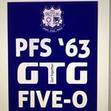Farouk Gulsara's Blog, page 151
February 11, 2017
Changing roles is hard to do!
 Parched (Hindi; 2016)
Parched (Hindi; 2016)
India is said to be a land of contradictions. On one hand, they talk about the might of the feminine power, that the Goddess guarding Earth is Booma Devi, Mother Nature, a matriarchal force. Then they say Shiva is nothing without the power of his better half, that Shiva is nothing without Shakthi and there is no force like the union of Male and Female power, the elixir of life, the essence of life, ShivaShakthi!
Then there is Dussehra which is celebrated as the victory of the good feminine powers over the evil masculine power, the celebrates the killing of demon Mahishasur by Goddess Durga. Dussehra celebration spreads the message of the balance of the world put to order by the positive female energy.
They can talk and write volumes and volumes, in their works of literature, about the greatness of the ladies of the yesteryear and their timeless feat. They donned military garbs to lead kingdoms. They fought for social justice. They wrote great poems in the Purana era and even discussed philosophy. But look at them now, or least in the fringe societies of modern India. They are second class citizens, sometimes persona-non-grata.
The movie highlights the struggles of four female characters in different standings in society. First, there is a lady, Rani, who was widowed young with a marriageable son. Physically abused in her short-lived marriage, she lives as an outcast in her Rajasthan desert village society. Her son, Gulab, is a useless good-for-nothing uneducated loafer who loiters around his worthless pals visiting prostitutes, smoking, getting drunk, heckling others and upholding their rights in a patriarchal society. Gulab's new wife is ridiculed and abused for her cropped hair. Then there is Lajjo, Rani's friend, who is married to an alcoholic and abusive husband, who is ostracised for her inability to bring an heir to the family when all the while the husband knows that he is the one who is firing blanks. The fourth character is Bijli, an exotic dancer who part-times as the village prostitute. Even though she is praised to high heavens and ogled by all men in the village in their stuporous states including the seemingly virtous Elders who claim to upholding morality in the village and youngsters alike, she is shunned by the villagers in civil society.
The multiple award-winning film brings through the journey of the frustrations of the four female characters and their empowerment in a society which scorns literacy amongst the fairer sex. Even though the men are held on the pedestal, their contributions have outlived their usefulness. With the changing of the economic order, the ladies prove their mettle to earn, even more than their male counterpart. This, is a bone of contention amongst members of the male-dominated society.http://asok22.wix.com/rifle-range-boy
http://.facebook.com/farouk.gulsara

Published on February 11, 2017 08:01
February 9, 2017
To be humbled in another man's shoes!
Pichaikaran (பிச்சைக்காரன், Beggar, Tamil; 2016)
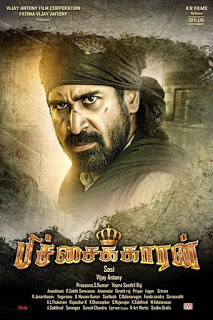 My friend told me that the tone for Chinese New Year this year is somewhat sombre, to put it mildly. Gone are the days when the eardrum exploding fire crackers used the usher the arrival of the lunar new year. Some low ranking staff are tightening their belts, resorting to wearing last year's unused garments for this year's celebrations. Sure, that is austerity but ask someone who has been on the other side of the numerous success stories of capitalism, the ones that the narcissistic politicians pat themselves much too often.
My friend told me that the tone for Chinese New Year this year is somewhat sombre, to put it mildly. Gone are the days when the eardrum exploding fire crackers used the usher the arrival of the lunar new year. Some low ranking staff are tightening their belts, resorting to wearing last year's unused garments for this year's celebrations. Sure, that is austerity but ask someone who has been on the other side of the numerous success stories of capitalism, the ones that the narcissistic politicians pat themselves much too often.
The people on the losing end of economic development have often been accused of many things; that they are lazy, have poor work ethics, that they do not plan, that they lack willpower and creativity. In reality, most of them do not fall into the categories above. They certainly do not lack in the creativity department. They have mastered the art of stretching the last ringgit to its last fibre. They live in well balanced but precarious household where just one small malady can tip the balance. A freak or careless accident, someone with a terminal illness to care, an ailing child to mind or even the beginning of a schooling year all heralds the start of a familial crisis when economic generation suffers. Meeting biological needs like hunger takes precedence over trivial matters like birthday and anniversary celebrations.
In its own way, this film, which was recommended by a close friend who had been on the losing end of development and managed to unshackle himself from its clutches. This film brought memories of his humble beginnings, and it tries to impress upon us that we are all beggars. The rich extend both palms to the divine in return for granting of personal boons. The poor do the same only to need their biological needs. The filmmaker, in his own cheeky way, tells us that begging is just another profession just like any vocations. There is a time for undivided attention at work to reap the best of what you can give and an 'after-office' time to unwind!
A scene from this movie went viral around the time of demonetization of ₹500 and ₹1,000 notes. In a prophetic way, in an unrelated snippet, a beggar calls in on a talk show to suggest discontinuation of the above notes to put a stop to India's poverty!
A recently returning foreign-trained MBA graduate, Arul, finds his mother, a mill owner, who is a success story of rags to riches, seriously injured in a freak accident in her factory. All the modern medical treatment at their disposal could not treat her serious head injury. She remain comatose. The advice from a sage suggests that Arul should do penance by living the life of a beggar for 48 days for his mother's recovery. In midst of all that, there is a maternal uncle who is hell bent on appropriating the whole business. There is still time for hero to find time for love during his crusade. Despite all the masala and mind bending scenes, it is still an enjoyable flick but don't ask me why our hero's one-week stubble remain unchanged over 48 days!http://asok22.wix.com/rifle-range-boy
http://.facebook.com/farouk.gulsara
 My friend told me that the tone for Chinese New Year this year is somewhat sombre, to put it mildly. Gone are the days when the eardrum exploding fire crackers used the usher the arrival of the lunar new year. Some low ranking staff are tightening their belts, resorting to wearing last year's unused garments for this year's celebrations. Sure, that is austerity but ask someone who has been on the other side of the numerous success stories of capitalism, the ones that the narcissistic politicians pat themselves much too often.
My friend told me that the tone for Chinese New Year this year is somewhat sombre, to put it mildly. Gone are the days when the eardrum exploding fire crackers used the usher the arrival of the lunar new year. Some low ranking staff are tightening their belts, resorting to wearing last year's unused garments for this year's celebrations. Sure, that is austerity but ask someone who has been on the other side of the numerous success stories of capitalism, the ones that the narcissistic politicians pat themselves much too often.The people on the losing end of economic development have often been accused of many things; that they are lazy, have poor work ethics, that they do not plan, that they lack willpower and creativity. In reality, most of them do not fall into the categories above. They certainly do not lack in the creativity department. They have mastered the art of stretching the last ringgit to its last fibre. They live in well balanced but precarious household where just one small malady can tip the balance. A freak or careless accident, someone with a terminal illness to care, an ailing child to mind or even the beginning of a schooling year all heralds the start of a familial crisis when economic generation suffers. Meeting biological needs like hunger takes precedence over trivial matters like birthday and anniversary celebrations.
In its own way, this film, which was recommended by a close friend who had been on the losing end of development and managed to unshackle himself from its clutches. This film brought memories of his humble beginnings, and it tries to impress upon us that we are all beggars. The rich extend both palms to the divine in return for granting of personal boons. The poor do the same only to need their biological needs. The filmmaker, in his own cheeky way, tells us that begging is just another profession just like any vocations. There is a time for undivided attention at work to reap the best of what you can give and an 'after-office' time to unwind!
A scene from this movie went viral around the time of demonetization of ₹500 and ₹1,000 notes. In a prophetic way, in an unrelated snippet, a beggar calls in on a talk show to suggest discontinuation of the above notes to put a stop to India's poverty!
A recently returning foreign-trained MBA graduate, Arul, finds his mother, a mill owner, who is a success story of rags to riches, seriously injured in a freak accident in her factory. All the modern medical treatment at their disposal could not treat her serious head injury. She remain comatose. The advice from a sage suggests that Arul should do penance by living the life of a beggar for 48 days for his mother's recovery. In midst of all that, there is a maternal uncle who is hell bent on appropriating the whole business. There is still time for hero to find time for love during his crusade. Despite all the masala and mind bending scenes, it is still an enjoyable flick but don't ask me why our hero's one-week stubble remain unchanged over 48 days!http://asok22.wix.com/rifle-range-boy
http://.facebook.com/farouk.gulsara

Published on February 09, 2017 14:47
February 7, 2017
The God realisation within us?
DMT: The Spirit Molecule (2010)
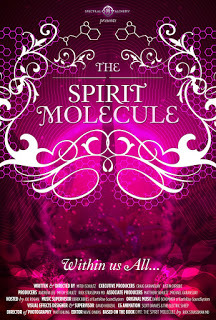 Every now and then, humankind experiences leaps and bounds into a higher level of knowledge, maybe not so much of wisdom. Still, they discover, one by one, about things around them; the laws of motion, thermodynamics, nuclear fission and fusion and quantum physics. The more they learn, the more they realise that there are things that they do not know! Perhaps they should now look inwards, introspect into their good selves to reach heights beyond their wildest dreams. DMT seem to be the linking bridge towards this end.
Every now and then, humankind experiences leaps and bounds into a higher level of knowledge, maybe not so much of wisdom. Still, they discover, one by one, about things around them; the laws of motion, thermodynamics, nuclear fission and fusion and quantum physics. The more they learn, the more they realise that there are things that they do not know! Perhaps they should now look inwards, introspect into their good selves to reach heights beyond their wildest dreams. DMT seem to be the linking bridge towards this end.
DMT, N, N-dimethyltryptamine, is a compound widely found in nature; in plants and animals alike. It has a ring structure with four attachable poles and is converted to tryptophan, a building block of life. Scientists are wondering if it is indeed the common language between beings.
Dr Rick Strassman who spent a good five years of his life experimenting on this hallucinogenic agent which is an analogue of serotonin and melatonin. As it alters perception and consciousness, it is said to be somehow involved in our of body experiences, alien abduction, communication with alien life forms and perhaps understand birth, life, death and even God! Practitioners of Kabbalah and even Descartes pointed to the pineal gland as a gateway to Divinity and a bedrock of morality and understanding of life.
In humans, DMT originates in the pineal gland and is secreted in certain situations. Interestingly, all over the Hindu scriptures, the pineal gland is the centre of the human energy and one who can control that organ, which appears as the third eye in Lord Shiva, has attained divine realm. The pineal gland is also the highest of chakra of Man's inner energy. Being the organ with the highest rate blood flow and rudimentary photopigment cells, it may indeed open the mystical third eye to greater inspiration, intuition, and inner vision to improve our existence.
DMT potions have been prepared by Native Americans for shamanic rituals for ages. Their hallucinogenic drink, Ayahuasca, helps to create a psychedelic experience that forms a doorway to a plane quite different than our dormant simple mind can comprehend. Aztec descendants still brew this concoction for their annual ultramarathons in the deserts.
Of late there has been a resurgence of usage of psychedelic drugs in medical treatment. After marijuana has been accepted for treatments of uncontrollable childhood seizures and terminal cancer patients, psilocybin (mushroom) and LSD are lobbied to be returned to mainstream use, not so much as for recreational reasons but for specific indications like bipolar disease and as a form cognitive therapy. Latest studies even find it not addictive as previously thought. Nobel prizes winners, like Francis Crick, used LSD to explore the secrets to the seed of life. Steve Jobs and Beatles' members are famous uses of this drug for their creativity and groundbreaking feats in human history.
“All truth passes through three stages. First, it is ridiculed. Second, it is violently opposed. Third, it is accepted as being self-evident.” -Arthur Schopenhauer, 1788-1860.
"Things in nature are not to be feared. They are to be learnt." -Marie Curie.
“Governments don't want a population capable of critical thinking, they want obedient workers, people just smart enough to run the machines and just dumb enough to passively accept their situation.” -George Carlin. http://asok22.wix.com/rifle-range-boy
http://.facebook.com/farouk.gulsara
 Every now and then, humankind experiences leaps and bounds into a higher level of knowledge, maybe not so much of wisdom. Still, they discover, one by one, about things around them; the laws of motion, thermodynamics, nuclear fission and fusion and quantum physics. The more they learn, the more they realise that there are things that they do not know! Perhaps they should now look inwards, introspect into their good selves to reach heights beyond their wildest dreams. DMT seem to be the linking bridge towards this end.
Every now and then, humankind experiences leaps and bounds into a higher level of knowledge, maybe not so much of wisdom. Still, they discover, one by one, about things around them; the laws of motion, thermodynamics, nuclear fission and fusion and quantum physics. The more they learn, the more they realise that there are things that they do not know! Perhaps they should now look inwards, introspect into their good selves to reach heights beyond their wildest dreams. DMT seem to be the linking bridge towards this end.DMT, N, N-dimethyltryptamine, is a compound widely found in nature; in plants and animals alike. It has a ring structure with four attachable poles and is converted to tryptophan, a building block of life. Scientists are wondering if it is indeed the common language between beings.
Dr Rick Strassman who spent a good five years of his life experimenting on this hallucinogenic agent which is an analogue of serotonin and melatonin. As it alters perception and consciousness, it is said to be somehow involved in our of body experiences, alien abduction, communication with alien life forms and perhaps understand birth, life, death and even God! Practitioners of Kabbalah and even Descartes pointed to the pineal gland as a gateway to Divinity and a bedrock of morality and understanding of life.
In humans, DMT originates in the pineal gland and is secreted in certain situations. Interestingly, all over the Hindu scriptures, the pineal gland is the centre of the human energy and one who can control that organ, which appears as the third eye in Lord Shiva, has attained divine realm. The pineal gland is also the highest of chakra of Man's inner energy. Being the organ with the highest rate blood flow and rudimentary photopigment cells, it may indeed open the mystical third eye to greater inspiration, intuition, and inner vision to improve our existence.
DMT potions have been prepared by Native Americans for shamanic rituals for ages. Their hallucinogenic drink, Ayahuasca, helps to create a psychedelic experience that forms a doorway to a plane quite different than our dormant simple mind can comprehend. Aztec descendants still brew this concoction for their annual ultramarathons in the deserts.
Of late there has been a resurgence of usage of psychedelic drugs in medical treatment. After marijuana has been accepted for treatments of uncontrollable childhood seizures and terminal cancer patients, psilocybin (mushroom) and LSD are lobbied to be returned to mainstream use, not so much as for recreational reasons but for specific indications like bipolar disease and as a form cognitive therapy. Latest studies even find it not addictive as previously thought. Nobel prizes winners, like Francis Crick, used LSD to explore the secrets to the seed of life. Steve Jobs and Beatles' members are famous uses of this drug for their creativity and groundbreaking feats in human history.
“All truth passes through three stages. First, it is ridiculed. Second, it is violently opposed. Third, it is accepted as being self-evident.” -Arthur Schopenhauer, 1788-1860.
"Things in nature are not to be feared. They are to be learnt." -Marie Curie.
“Governments don't want a population capable of critical thinking, they want obedient workers, people just smart enough to run the machines and just dumb enough to passively accept their situation.” -George Carlin. http://asok22.wix.com/rifle-range-boy
http://.facebook.com/farouk.gulsara

Published on February 07, 2017 08:01
February 4, 2017
In no one we trust
HyperNormalisation (2016)
Written and Directed by Adam Curtis
Before the infamous 2004 tsunami hit Phi Phi Island in Thailand, there was a kind of an eerie silence. The shoreline receded and thousands of fishes were washed ashore. The cockle collectors had a windfall. Everyone was in a quandary on the bizarre turns of events. Then it hit them, the towering waves and destruction.
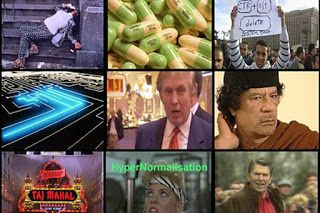 www.spectator.co.ukThat is what is happening in our world. Many strange and damaging thinks are happening right before our eyes. Our leaders are telling us that everything is okay and it is business as usual or rather life goes on. However, everybody knows it is not alright but still nobody wants to do anything because things are too complicated. This, in simpler terms, is the essence of the meaning of the word 'hyper normalisation', a term coined by a Russian writer (Alexei Yurchak in 2006 book, 'Everything was Forever, Until it was No More: The Last Soviet Generation') referring to the time during Soviet Russia when everything was not right but everyone was given the impression that everything was hunky dory when it was not. The collapse, it was crystal clear and inevitable. Everyone knew but nobody would and could do anything about it.
www.spectator.co.ukThat is what is happening in our world. Many strange and damaging thinks are happening right before our eyes. Our leaders are telling us that everything is okay and it is business as usual or rather life goes on. However, everybody knows it is not alright but still nobody wants to do anything because things are too complicated. This, in simpler terms, is the essence of the meaning of the word 'hyper normalisation', a term coined by a Russian writer (Alexei Yurchak in 2006 book, 'Everything was Forever, Until it was No More: The Last Soviet Generation') referring to the time during Soviet Russia when everything was not right but everyone was given the impression that everything was hunky dory when it was not. The collapse, it was crystal clear and inevitable. Everyone knew but nobody would and could do anything about it.
In Curtis' normal hypnotising narration and documentary making techniques, he tries to make sense of current political climate we are in. He, in his conspiracy theorists' manner, tells us that that Man is stuck with this method of administration even though it is not the best where other ways have failed and how many of our manoeuvres have blown right in our faces, giving just the opposite of the intended desire.
The real world is complicated and our leaders have made it simpler for us, maybe far too simple to stay in power.
Although presented in nine somewhat disjointed parts, the whole narration may make sense at the end. In 1975, when New York City was having a crisis in its administration, it was soon realised that what it needs was not political leaders who would make policies but bankers who could provide finances. Money was needed to rule the world, not ideologies. Radical minded social reformers who used to dictate the scene during the times when factories workers and unions controlled their bosses, being out of money, fled to indulge in appreciation of abstract arts and music.
Over on the other side of the globe, in Damascus, Hafez al-Assad was trying to splurge Americans out of Middle East. Unfortunately, things only got worse with the Lebanon War in 1982. That is when Syria's liaison with Iran brought together Shia freedom fighters Hezbollah and Hamas, Palestinian freedom fighters. Their modus operandi of using suicide bombers, which by all accounts, is not sanctioned by Islam, seem to be the turning point. Americans left Syria in a huff in 1984 with their tails between their hind legs due to 'paralysis caused by the complexity of the situation'. It is funny this same life-saver has come to haunt Syria once again, now Arab solidarity and Syria is in shambles.
Here, again political intervention by Henry Kissinger's shuttle diplomacy proved futile. His plan was to create constructive ambiguity to destabilise the Middle East to keep each other in check without solving the real issue at hand.
Libya's cartoonish leader Colonel Gaddafi became the lame dog accused of all of the atrocities around the world. Even though the Lockerbie downing of PanAm flight and other bombings were done by Syria, according to intelligence sources, Gaddafi did not mind being branded as the villain. He like the fear factor. Americans knew that attacking Syria is too risky. Hence, Libya was bombed instead.
With the advent of technology and creation of cyberspace, many things happened. People toyed the idea that perhaps the collection of data of Man, their likes and dislikes could be used to predict their predictability. The technocrats thought, maybe, science could be used to improve chances of winning bets, gambling and making money. It proved not successful. What it created was a group of narcissistic people, who found pleasure in trivialities and create an artificial environment to reinforce their self-reassurance. They heard and saw what they wanted to hear and see. It became a tool of perception management.
Many sightings of Unidentified Flying Objects became a common occurrence. There was talk that these were nothing more than the Army's attempt at developing stealth and more advanced killing machines. People became more distrustful of their leaders. This is when social media became a device to gather people against a common enemy - their Government. Demonstrations started the world over- the Arab Springs, the Tahrir Square and Occupy Movement. Even the cyberspace was good at getting together for a single cause, the upheaval did not progress. There was no future long term plan. The public loss of confidence in those in power is the main reason for the unexpected turn of events in Brexit and Donald Trump's appointment as the President of USA.http://asok22.wix.com/rifle-range-boy
http://.facebook.com/farouk.gulsara
Written and Directed by Adam Curtis
Before the infamous 2004 tsunami hit Phi Phi Island in Thailand, there was a kind of an eerie silence. The shoreline receded and thousands of fishes were washed ashore. The cockle collectors had a windfall. Everyone was in a quandary on the bizarre turns of events. Then it hit them, the towering waves and destruction.
 www.spectator.co.ukThat is what is happening in our world. Many strange and damaging thinks are happening right before our eyes. Our leaders are telling us that everything is okay and it is business as usual or rather life goes on. However, everybody knows it is not alright but still nobody wants to do anything because things are too complicated. This, in simpler terms, is the essence of the meaning of the word 'hyper normalisation', a term coined by a Russian writer (Alexei Yurchak in 2006 book, 'Everything was Forever, Until it was No More: The Last Soviet Generation') referring to the time during Soviet Russia when everything was not right but everyone was given the impression that everything was hunky dory when it was not. The collapse, it was crystal clear and inevitable. Everyone knew but nobody would and could do anything about it.
www.spectator.co.ukThat is what is happening in our world. Many strange and damaging thinks are happening right before our eyes. Our leaders are telling us that everything is okay and it is business as usual or rather life goes on. However, everybody knows it is not alright but still nobody wants to do anything because things are too complicated. This, in simpler terms, is the essence of the meaning of the word 'hyper normalisation', a term coined by a Russian writer (Alexei Yurchak in 2006 book, 'Everything was Forever, Until it was No More: The Last Soviet Generation') referring to the time during Soviet Russia when everything was not right but everyone was given the impression that everything was hunky dory when it was not. The collapse, it was crystal clear and inevitable. Everyone knew but nobody would and could do anything about it.In Curtis' normal hypnotising narration and documentary making techniques, he tries to make sense of current political climate we are in. He, in his conspiracy theorists' manner, tells us that that Man is stuck with this method of administration even though it is not the best where other ways have failed and how many of our manoeuvres have blown right in our faces, giving just the opposite of the intended desire.
The real world is complicated and our leaders have made it simpler for us, maybe far too simple to stay in power.
Although presented in nine somewhat disjointed parts, the whole narration may make sense at the end. In 1975, when New York City was having a crisis in its administration, it was soon realised that what it needs was not political leaders who would make policies but bankers who could provide finances. Money was needed to rule the world, not ideologies. Radical minded social reformers who used to dictate the scene during the times when factories workers and unions controlled their bosses, being out of money, fled to indulge in appreciation of abstract arts and music.
Over on the other side of the globe, in Damascus, Hafez al-Assad was trying to splurge Americans out of Middle East. Unfortunately, things only got worse with the Lebanon War in 1982. That is when Syria's liaison with Iran brought together Shia freedom fighters Hezbollah and Hamas, Palestinian freedom fighters. Their modus operandi of using suicide bombers, which by all accounts, is not sanctioned by Islam, seem to be the turning point. Americans left Syria in a huff in 1984 with their tails between their hind legs due to 'paralysis caused by the complexity of the situation'. It is funny this same life-saver has come to haunt Syria once again, now Arab solidarity and Syria is in shambles.
Here, again political intervention by Henry Kissinger's shuttle diplomacy proved futile. His plan was to create constructive ambiguity to destabilise the Middle East to keep each other in check without solving the real issue at hand.
Libya's cartoonish leader Colonel Gaddafi became the lame dog accused of all of the atrocities around the world. Even though the Lockerbie downing of PanAm flight and other bombings were done by Syria, according to intelligence sources, Gaddafi did not mind being branded as the villain. He like the fear factor. Americans knew that attacking Syria is too risky. Hence, Libya was bombed instead.
With the advent of technology and creation of cyberspace, many things happened. People toyed the idea that perhaps the collection of data of Man, their likes and dislikes could be used to predict their predictability. The technocrats thought, maybe, science could be used to improve chances of winning bets, gambling and making money. It proved not successful. What it created was a group of narcissistic people, who found pleasure in trivialities and create an artificial environment to reinforce their self-reassurance. They heard and saw what they wanted to hear and see. It became a tool of perception management.
Many sightings of Unidentified Flying Objects became a common occurrence. There was talk that these were nothing more than the Army's attempt at developing stealth and more advanced killing machines. People became more distrustful of their leaders. This is when social media became a device to gather people against a common enemy - their Government. Demonstrations started the world over- the Arab Springs, the Tahrir Square and Occupy Movement. Even the cyberspace was good at getting together for a single cause, the upheaval did not progress. There was no future long term plan. The public loss of confidence in those in power is the main reason for the unexpected turn of events in Brexit and Donald Trump's appointment as the President of USA.http://asok22.wix.com/rifle-range-boy
http://.facebook.com/farouk.gulsara

Published on February 04, 2017 23:15
February 2, 2017
Traitor or Saviour?
Snowden (2016)
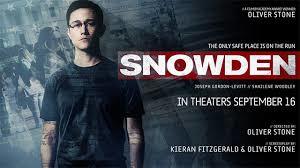 The Federalist Papers were a series of 85 letters penned by the founding fathers, John Jay, James Madison and Andrew Hamilton under the pseudonym of Publius to cajole the American public to ratify the American constitution. The essays are said to be very foresighted in its outlook. It admits that man, being man, can never be unbiased. He is forever swayed by emotions, lust, greed, power, control and all the traits that makes him human. Hence, he cannot be entrusted to be a just leader. Checks and balances had to be put to ensure continuity of the sovereignty of the nation. They suggested that the fall of great empires in the past due to it absence and placing of too much power on the elite few. The common man too had a duty to partake in the running of his country.
The Federalist Papers were a series of 85 letters penned by the founding fathers, John Jay, James Madison and Andrew Hamilton under the pseudonym of Publius to cajole the American public to ratify the American constitution. The essays are said to be very foresighted in its outlook. It admits that man, being man, can never be unbiased. He is forever swayed by emotions, lust, greed, power, control and all the traits that makes him human. Hence, he cannot be entrusted to be a just leader. Checks and balances had to be put to ensure continuity of the sovereignty of the nation. They suggested that the fall of great empires in the past due to it absence and placing of too much power on the elite few. The common man too had a duty to partake in the running of his country.
Maybe the placing of too much of emphasis on the idea of nation and less on humanity, some 'well meaning' group of people or vested individuals took the concept of nation security and fear of losing out to the enemy of the state to a different level.
The American way of life and their interference in affairs of others must have ruffled a few feathers here and there. The affluence comes with a price, national security. Living in a porous world, creating mischief has never been easier. Keeping peace, law and order is getting harder by the day. Surveillance too has become high-tech. The enemy remains unseen. So what do the law enforcers do? They spy upon their citizen, hence, denying them of privacy permitted under the Constitution. This forms the basis of the movie based on NSA's world-famous whistleblower, Edward Snowden.
Snowden, as an employee of the America's sensitive branches of law enforcement, CIA and NSA, found too many wrongdoings against his fellow citizen under the cloak of national security. This is his story, starting with his legendary clandestine interview in Hotel Mira in Hong Kong. It flashes back early into his career, various news snippets of the time and his final internet interview to an American TV station from an undisclosed location in Russian after his passport was revoked by the USA.
The question that remained unanswered is whether what Snowden did is treason for exposing sensitive national security information or a saviour for preventing the continued dupe of the general public of their rights?http://asok22.wix.com/rifle-range-boy
http://.facebook.com/farouk.gulsara
 The Federalist Papers were a series of 85 letters penned by the founding fathers, John Jay, James Madison and Andrew Hamilton under the pseudonym of Publius to cajole the American public to ratify the American constitution. The essays are said to be very foresighted in its outlook. It admits that man, being man, can never be unbiased. He is forever swayed by emotions, lust, greed, power, control and all the traits that makes him human. Hence, he cannot be entrusted to be a just leader. Checks and balances had to be put to ensure continuity of the sovereignty of the nation. They suggested that the fall of great empires in the past due to it absence and placing of too much power on the elite few. The common man too had a duty to partake in the running of his country.
The Federalist Papers were a series of 85 letters penned by the founding fathers, John Jay, James Madison and Andrew Hamilton under the pseudonym of Publius to cajole the American public to ratify the American constitution. The essays are said to be very foresighted in its outlook. It admits that man, being man, can never be unbiased. He is forever swayed by emotions, lust, greed, power, control and all the traits that makes him human. Hence, he cannot be entrusted to be a just leader. Checks and balances had to be put to ensure continuity of the sovereignty of the nation. They suggested that the fall of great empires in the past due to it absence and placing of too much power on the elite few. The common man too had a duty to partake in the running of his country.Maybe the placing of too much of emphasis on the idea of nation and less on humanity, some 'well meaning' group of people or vested individuals took the concept of nation security and fear of losing out to the enemy of the state to a different level.
The American way of life and their interference in affairs of others must have ruffled a few feathers here and there. The affluence comes with a price, national security. Living in a porous world, creating mischief has never been easier. Keeping peace, law and order is getting harder by the day. Surveillance too has become high-tech. The enemy remains unseen. So what do the law enforcers do? They spy upon their citizen, hence, denying them of privacy permitted under the Constitution. This forms the basis of the movie based on NSA's world-famous whistleblower, Edward Snowden.
Snowden, as an employee of the America's sensitive branches of law enforcement, CIA and NSA, found too many wrongdoings against his fellow citizen under the cloak of national security. This is his story, starting with his legendary clandestine interview in Hotel Mira in Hong Kong. It flashes back early into his career, various news snippets of the time and his final internet interview to an American TV station from an undisclosed location in Russian after his passport was revoked by the USA.
The question that remained unanswered is whether what Snowden did is treason for exposing sensitive national security information or a saviour for preventing the continued dupe of the general public of their rights?http://asok22.wix.com/rifle-range-boy
http://.facebook.com/farouk.gulsara

Published on February 02, 2017 14:17
February 1, 2017
Money sanitises everything?
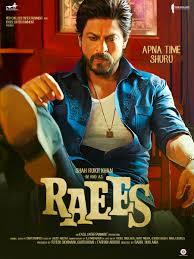 Raees (Hindi, 2017)
Raees (Hindi, 2017)
When a man is desperate, when his next meal is an impossible dream, any form of work that comes his way is God-sent. He will be grateful that the Divine forces are responsive to his pleas to meet his biological need. When his position is a bit stable, he introspects. He wonders whether his line of duty may irk the Creator. He feels guilty. He knows that his line of work is not sanctioned by the religious leaders who delved into this type of theological matters. He knows he has himself knee deep to retreat. His dependents, who by now are quite used to the good life start demanding. He would set his own modified rules, cherry picking rules and regulations to justify his illicit trade. He draws his boundaries, area which are a no-no and would defend his modified predilections to the core. Deep inside, he knows of his ill actions. To sanitise his 'sins', which actually do not appear in his psyche anymore, he immerses himself in philanthropic deeds and in the quest to uplift society in a Robin Hood manner.
This are some of the thoughts that went through my mind as I viewed Shah Rukh Khan's latest offering, Raees. The formula of the storyline is nothing new, just the time test money churning flick of rags to riches ala-Godfather style, only the settings are different. This time the Prime Minister's state of Gujarat which had outlawed alcohol sales since 1949, after the demise of Gandhi, under the Bombay Prohibition Act.
Legally Gujarat is a 'dry' state, as no one wants to stir the sentiments of the public as the abhorrence to alcohol is started as a mark of respect to his assassination. In reality, moonshine is still available, sometimes cheaper from other states as the merchandise is adulterated and no taxes need to be paid.
Even though, the filmmakers deny any resemblance to any living or dead characters, the film is said to to be loosely based on a criminal named Abdul Latif, a Mumbai gangster linked to many criminal activities including supplying RDX explosives in the 1993 Mumbai blast. The movie follows a predictable pattern with all the winning formulas of tear, gore, revenge, blood, love and emotions to drive home the point that a life of crime does not pay. And that even ruthless gangster have a soft spot and code of conduct.p.p1 {margin: 0.0px 0.0px 0.0px 0.0px; font: 12.0px 'Helvetica Neue'; color: #454545} p.p2 {margin: 0.0px 0.0px 0.0px 0.0px; font: 12.0px 'Helvetica Neue'; color: #454545; min-height: 14.0px}
N.B. Time and time again, it is evidently clear that Prohibition of alcohol does not give the desired effect. Conversely, it gives a paradoxically opposite response. When this strategy was implemented in the 1920s in the US in response to ill effects of alcohol, what was achieved was not abstinence but bootlegging, complications of adulteration, gangsterism, senseless killing and a corrupt police force! The correct approach may be the way the British thumbed communist activities in Malaya in a propaganda that "wins the heart and mind". Sadly, we are still in want of such a strategy!http://asok22.wix.com/rifle-range-boy
http://.facebook.com/farouk.gulsara

Published on February 01, 2017 01:27
January 30, 2017
What future holds?
I do not think any songs in any other languages carry as much philosophy in its lyrics as the Tamil movie songs do. The songs are not merely evergreen for its entertainment value but it also disseminates values useful in our daily lives. It may resonate to all irrespective of their individual theological beliefs and convictions on the purpose of their existence on Earth.
Perhaps I am not up to date with the latest numbers that are churned out of Kollywood but their golden era of Tamil songs for its meaningful lyrics are from the 50s all through the 80s. Speakers of this ancient language will appreciate the deep meanings that songs of that period convey. Thanks to poets of that time bracket, in the likes of Kannadasan, Vaali, Pulmaipithan, Pattukottai Kalyanasundaram and many more.
In this scene from a 1958 film, Thai Piranthaal Vazhi Pirakkum (New Path is paved with the birth of the month of Thai) our undulating ups and downs of the voyage of life are succinctly depicted in a most poetic way. Our uncertainties, our path, our experiences are metaphorically narrated by the oarsman as he transports his passengers across the symbolic of river of life. Come listen...
ஆசையே அலைபோலேHumans are a group of an insecure lot. We are all in it in the ocean of life. We know we all have to go somewhere. There are no roadmaps, no path to follow but we all know that the endpoint, the final destination is fixed. We make our rules and regulations as we go along without any guidance from those who have reached their goal, their journey, miscalculated trip or the final truth. We all are fixated the path we follow is the Truth and are hellbent to defend it all cost even at the expense of our lives and fellow sojourners who are equally clueless and are groping in the dark like us. Lest we forget that all roads lead to Rome. Of course, the scenery will differ, the experience varied. So, sit back, relax, put on that seat belt, keep that seat upright, we have gone through some turbulence but we will be landing shortly. Enjoy the view of the skyline of the city.http://asok22.wix.com/rifle-range-boy
நாமெல்லாம் அதன்மேலே
ஓடம் போலே ஆடிடுவோமே வாழ்நாளிலே
பருவம் என்னும் காற்றிலே
பறக்கும் காதல் தேரிலே
ஆணும் பெண்ணும் மகிழ்வார் சுகம் பெறுவார்
அதிசயம் காண்பார்
நாளை உலகின் பாதையை இன்றே யார் காணுவார்?
வாழ்க்கை எல்லாம் தீர்ந்ததேன்
வடிவம் மட்டும் வாழ்வதேன்
இளமை மீண்டும் வருமா?
மணம் பெறுமா?
முதுமையே சுகமா?
காலம் போகும் பாதையை இங்கே யார் காணுவார்?
சூரைக்காற்று மோதினால் தோணி ஓட்டம் மேவுமோ?
வாழ்வில் துன்பம் வரவு சுகம் செலவு இருப்பது கனவு
காலம் வகுத்த கணக்கை இங்கே யார் காணுவார்?
Our desires are like waves,
We are all on it,
Like a boat, we dance our days away.
In the gust of youthfulness,
Swift goes the chariot of love,
Man and woman explore pleasure and happiness
experience magic.
Who can see the path of tomorrow's world?
Life has ended,
but remnants still linger.
Can youth return?
can senescence be fun?
The path led by time, who knows where to?
When a storm hit a boat,
can it sail smoothly?
In life, sadness is income, happiness the expenditure, our existence a dream.
What time has set for us here, can anybody tell?
http://.facebook.com/farouk.gulsara

Published on January 30, 2017 08:03
January 28, 2017
Future, Who writes it? You or the stars?
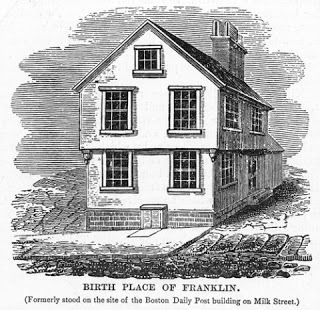 The birthplace of Jane and Benjamin Franklin.
The birthplace of Jane and Benjamin Franklin. Jane would live here for most of her life, while
Benjamin would leave to pursue his apprenticeship.
(brainpickings.org)Heard a podcast recently on one of the American founding fathers, Benjamin Franklin. As is well known, he emerged from a humble beginning, of a son of a poor candle and soap maker, to propel himself away from the clutches of poverty, to pull himself up with his boots strap even though he could not afford boots. Benjamin, a polymath, later became a printer, a master inventor, a diplomat, established the mail service and had a hand in the drafting the Declaration of Independence.
He was self-taught. Together with his favourite sister, Jenny (out of 16 other siblings), they used to teach each other. Twist of fate, Benjamin left his home to work in a printing press run by his brother. One thing led to another and he left the job. He later managed to establish himself as a printer. In his printing company, he took many government contracts, including printing notes. In those days, paper was made from rags. Franklin used to advertise in his newspaper for rags for his mill. The rags eventually were made into money, enriching him tremendously. This eventually coined the phrase 'rag to riches' which we still use today.
Jenny was not as lucky as her brother. Married at 15 to an older man who was a slave to the bottle and an underachiever, her world revolved around being her nanny to the result of her 22 pregnancies, keeping the family afloat amidst her husband's numerous failed business ventures. Jenny and Benny continued corresponding over the years.
Two siblings started on the same footing but both ended up in different ends of society. In one of the letters, Jenny mentioned, many things in life are beyond our control. Things just happen.
We may think we have it all cover. Nothing can go wrong. There is Plan B and even Plan C. Just when you think it is going to be alright, bam it hit you. Things beyond your control hit you in your face, catching you off-guard. Murphy's law show your fallibility and puts you at your rightful place. Embark Peter's Law, find your right footing.
http://asok22.wix.com/rifle-range-boy
http://.facebook.com/farouk.gulsara

Published on January 28, 2017 08:30
January 26, 2017
A different perspective of US history
The Untold History of the United States (2012, Documentary)
Written, Directed and Narrated by Oliver Stone
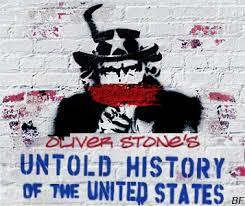
In essence life on Earth never changed. The animalistic yearn for power, blood and control never left us even though we left our nomadic ways, our parchments and dressed in 'modern attires'. This documentary, coming from a controversial filmmaker, Oliver Stone, is a must watch for history buffs who believe that history is not just a dead subject about dead people. After all, history is supposed to regularly discussed, dissected, analysed and argued with the understanding that history repeats itself. One who does not appreciate the follies of history is bound to repeat its indiscretion.
This set of documentary comprise 10 regular one-hour episodes and two prequels which cover almost a century of the rise of the United States of America after it had tamed the Wild West and its southern neighbours in the late 19th century to hail as the only remaining reigning Empire after the fall of the Russian, Hungarian-Prussian and British Empires in the 20th century. That is until now. There lurking in the horizon is the Chinese Red Army hard-headed to rule the world, so they say.
The story of the beginning of the United States of America started after it completed its local conquest. The country 'tamed' the Wild West, the 'bandits' from the South and hailed over its 'savage' neighbours. If that was not good enough, the then President in 1898, William McKinley said, "Let's make America great." If that sounds familiar, you are right. It was the battle cry of a certain aspiring Presidential candidate.
An overheated boiler aboard USS Maine sank while travelling in the Caribbeans. The Spaniards were falsely accused of gunning down the US vessel and justified the Americo-Spanish War which the Americans won. Their booty from the war was Cuba and Philippines. The American businesses started prospering from Cuba. That must have been the beginning of relocation of American businesses.
With the gunning of British ocean liner, RMS Lusitania, in American waters carrying its citizens, by a German U-boat on the accusation that it was carrying ammunition, together with the Zimmerman telegram later, gave the US a justification to pull themselves into the World War 1. The accolades that they received after the war gave them the idea that war was indeed big business. They made it their divine calling to meddle in affairs of other countries in the name of liberty, freedom and social justice.
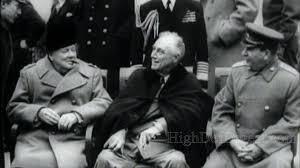 Churchill, Roosevelt and StalinNapoleon Bonaparte was quoted to have said that history is a pack of lies agreed upon. This series of documentary gives another perspective of history that were told to us. It highlights the many blunders or purposeful serious disservices done by the US government to the people of the world. The storyteller posits that the real villains of the world are not the Communist Russians but, surprise, surprise, the Americans. The Russians are portrayed as the unsung heroes. Just like how they rose to defend themselves against the advancing Napoleonic army, the Russians, with no help from the rest of world, singlehandedly held forts in Leningrad and Stalingrad against the Nazis. In fact, they were instrumental in ending the Second World War. The Russian Army is the one who advanced to the Fuhrer-bunker. Their soldiers in the Eastern front crippled Japan and the Japanese were asking for mercy and unconditional surrender even before Hiroshima and Nagasaki mushroom clouds! The Russians had the highest fatality of the war at 27 million. The understaffed British did not win the Blitz due to their tenacity and patriotism but because the German resources were stuck in fighting the Russians.
Churchill, Roosevelt and StalinNapoleon Bonaparte was quoted to have said that history is a pack of lies agreed upon. This series of documentary gives another perspective of history that were told to us. It highlights the many blunders or purposeful serious disservices done by the US government to the people of the world. The storyteller posits that the real villains of the world are not the Communist Russians but, surprise, surprise, the Americans. The Russians are portrayed as the unsung heroes. Just like how they rose to defend themselves against the advancing Napoleonic army, the Russians, with no help from the rest of world, singlehandedly held forts in Leningrad and Stalingrad against the Nazis. In fact, they were instrumental in ending the Second World War. The Russian Army is the one who advanced to the Fuhrer-bunker. Their soldiers in the Eastern front crippled Japan and the Japanese were asking for mercy and unconditional surrender even before Hiroshima and Nagasaki mushroom clouds! The Russians had the highest fatality of the war at 27 million. The understaffed British did not win the Blitz due to their tenacity and patriotism but because the German resources were stuck in fighting the Russians.
The author paints a very favourable view of FDR, the unprecedented 4-times US President. FDR, a visionist, with his reforms took the US out of Depression which was an after-effect of the euphoria of the Roaring Twenties to put things right again. He was also instrumental in getting Britain's foe and Communist leader Josef Stalin to the negotiation table to end WW2.
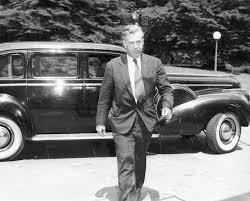 Henry WallaceFDR's Secretary of Agriculture, Henry Wallace, his promising successor who revolutionised crop cultivation during the Post-Depression era, was bowled over at the National Conference as the Vice President. Wallace gave the aura of being a pacifist and yearning for Man to live in harmony. Of course, that was bad for business. War was good business! FDR had to give in to the 'powers that be' to endorse Harry Truman. Truman would later prove to be a thorn who would rock the world peace at large. His finger was at the trigger to launch Fat Boy and Little Man. Probably the world would have a different path if Wallace had been President. A disgruntled Wallace with his left-leaning sentiments never got much attention even after he stood as a candidate in a different party, The Progressive Party.
Henry WallaceFDR's Secretary of Agriculture, Henry Wallace, his promising successor who revolutionised crop cultivation during the Post-Depression era, was bowled over at the National Conference as the Vice President. Wallace gave the aura of being a pacifist and yearning for Man to live in harmony. Of course, that was bad for business. War was good business! FDR had to give in to the 'powers that be' to endorse Harry Truman. Truman would later prove to be a thorn who would rock the world peace at large. His finger was at the trigger to launch Fat Boy and Little Man. Probably the world would have a different path if Wallace had been President. A disgruntled Wallace with his left-leaning sentiments never got much attention even after he stood as a candidate in a different party, The Progressive Party.
WW1 boosted the image of the US as a force to reckon after this 'Johnny come lately' entered fashionably late. The fantastic demigod reception that it received in the post-war celebrations convinced the politicians and businessmen that war was indeed a necessary evil. Businesses prospered. FDR with his state-funded mammoth projects scaled the country into dizzying heights with its leaps in engineering feats. Businesses of various sorts expanded briskly to other shores. American influence on other countries' political direction as well as their citizens' affluence snowballed.
In the Spanish Civil War, rebels fighting a democratically elected government were armed, thanks to the Americans. Even when the Germans were busy attacking their neighbours, building their armamentarium and sending Jews to go the gas chambers, it was business as usual. The bankers, the oil merchants and the industries continued their transactions with Germany.
To please his ailing ally, Britain, Truman painted a bleak picture of Soviet Union as the evil dark atheistic power out for world domination. The distrust against the Communist Russian arose from their vicious opposition to Capitalism and that their thinking was considered Oriental, hence, inferior due to their geographical location.
The post-war rebuilding exercise was basically a US gesture to appease its allies. The Russian were portrayed as the Devil and an enemy to the world order. The stories of Stalin's brutal punishment of his toes just proved their point. The rebuilding of collapsed economy of Europe was aided by US-appointed banks through World Bank and IMF whose only priority is the safeguard US' interests and ensure a constant flow of moolah back for continuity of the good life for the Americans. Marshall's plan for a devasted Europe was just that - build Europe, build businesses and US businesses and the US would prosper. The war puckered Britain had to pass the baton of world hegemony to the US and they became their defacto lap dog.
With the help of world media and the lingua franca of the world, the Americans were painted with the consistently favourable stroke of monochromatic paintwork. The US could do no wrong, they were the good guys, they fought just wars and God was on their side!
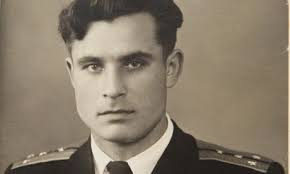 Vasili ArkhipovWorld domination continued with the threat of nuclear war as their bargaining chip. That was until the Soviet Union and China followed suit. Before that, irreparable damage had already been done to world peace. Meddling in almost all the countries in the world became like a second nature to the US. Almost no country had been immune to their interference - Cuba, Guatemala, El Salvador, Chile, Panama and the rest of Latin America; Algeria, Congo, Egypt and many newly independent post-colonial African states; Iran, Iraq, Korea, Vietnam, Indonesia; Spain, Portugal, Greece and many European countries as well.
Vasili ArkhipovWorld domination continued with the threat of nuclear war as their bargaining chip. That was until the Soviet Union and China followed suit. Before that, irreparable damage had already been done to world peace. Meddling in almost all the countries in the world became like a second nature to the US. Almost no country had been immune to their interference - Cuba, Guatemala, El Salvador, Chile, Panama and the rest of Latin America; Algeria, Congo, Egypt and many newly independent post-colonial African states; Iran, Iraq, Korea, Vietnam, Indonesia; Spain, Portugal, Greece and many European countries as well.
The Cold War which started after the division of spoils amongst the victors of WW2 slowly evolved into an arms race and space race. The climax of the chase to arms supremacy must surely be the Cuba missile crisis in 1962 which almost sparked the third World War if not for the mindful inactivity of a Russian officer, Vasili Arkhipov. A Russian submarine carrying missile warheads was shot at by Americans. Not knowing that they were warning shots and their telecommunication services were down, the crew had to put to vote whether to launch the nuclear bomb. The decisive vote by Arkhipov averted Armageddon!
The US continued their self-appointed 'policeman of the World' duty by meddling into other countries affairs. Whenever a popular leader passes a decree which appears detrimental to the American interest, specifically business ventures, the US would support and finance rebel groups in that country to create mayhem. When pandemonium finally ensues, the Americans would march in like saviours to save the day on their terms.
Is it coincidence or is mere divine mirth? Whenever a US leader who shows preponderance for peace and brotherly cohabitants, his tenure seem short lived. It has been too many times in the case of Henry Wallace, JFK and his brother Robert. There seem to be an 'invincible hand' that seem to steer the world to destruction. The trail of blood and misery left by the military actions of the Yankees can best be described as inhumane with the usage of herbicides, poison gases, biological agents and radiating substances. The loss of human lives is pale in comparison to the environmental degradation.
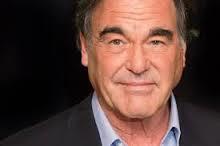 Oliver StoneWith the rise of USA as the lone superpower of the world spells danger. The serene world as we knew in the 19th century is now a denuded planet with its equally restless population unable to stomach the effects of American hegemony. Presidents after Presidents have come and gone, promising a new dawn which never materialised. Peace is a forgotten word The rich become richer and poor remain impoverished. The American way of life has permeated all layers of society.http://asok22.wix.com/rifle-range-boy
Oliver StoneWith the rise of USA as the lone superpower of the world spells danger. The serene world as we knew in the 19th century is now a denuded planet with its equally restless population unable to stomach the effects of American hegemony. Presidents after Presidents have come and gone, promising a new dawn which never materialised. Peace is a forgotten word The rich become richer and poor remain impoverished. The American way of life has permeated all layers of society.http://asok22.wix.com/rifle-range-boy
http://.facebook.com/farouk.gulsara
Written, Directed and Narrated by Oliver Stone

In essence life on Earth never changed. The animalistic yearn for power, blood and control never left us even though we left our nomadic ways, our parchments and dressed in 'modern attires'. This documentary, coming from a controversial filmmaker, Oliver Stone, is a must watch for history buffs who believe that history is not just a dead subject about dead people. After all, history is supposed to regularly discussed, dissected, analysed and argued with the understanding that history repeats itself. One who does not appreciate the follies of history is bound to repeat its indiscretion.
This set of documentary comprise 10 regular one-hour episodes and two prequels which cover almost a century of the rise of the United States of America after it had tamed the Wild West and its southern neighbours in the late 19th century to hail as the only remaining reigning Empire after the fall of the Russian, Hungarian-Prussian and British Empires in the 20th century. That is until now. There lurking in the horizon is the Chinese Red Army hard-headed to rule the world, so they say.
The story of the beginning of the United States of America started after it completed its local conquest. The country 'tamed' the Wild West, the 'bandits' from the South and hailed over its 'savage' neighbours. If that was not good enough, the then President in 1898, William McKinley said, "Let's make America great." If that sounds familiar, you are right. It was the battle cry of a certain aspiring Presidential candidate.
An overheated boiler aboard USS Maine sank while travelling in the Caribbeans. The Spaniards were falsely accused of gunning down the US vessel and justified the Americo-Spanish War which the Americans won. Their booty from the war was Cuba and Philippines. The American businesses started prospering from Cuba. That must have been the beginning of relocation of American businesses.
With the gunning of British ocean liner, RMS Lusitania, in American waters carrying its citizens, by a German U-boat on the accusation that it was carrying ammunition, together with the Zimmerman telegram later, gave the US a justification to pull themselves into the World War 1. The accolades that they received after the war gave them the idea that war was indeed big business. They made it their divine calling to meddle in affairs of other countries in the name of liberty, freedom and social justice.
 Churchill, Roosevelt and StalinNapoleon Bonaparte was quoted to have said that history is a pack of lies agreed upon. This series of documentary gives another perspective of history that were told to us. It highlights the many blunders or purposeful serious disservices done by the US government to the people of the world. The storyteller posits that the real villains of the world are not the Communist Russians but, surprise, surprise, the Americans. The Russians are portrayed as the unsung heroes. Just like how they rose to defend themselves against the advancing Napoleonic army, the Russians, with no help from the rest of world, singlehandedly held forts in Leningrad and Stalingrad against the Nazis. In fact, they were instrumental in ending the Second World War. The Russian Army is the one who advanced to the Fuhrer-bunker. Their soldiers in the Eastern front crippled Japan and the Japanese were asking for mercy and unconditional surrender even before Hiroshima and Nagasaki mushroom clouds! The Russians had the highest fatality of the war at 27 million. The understaffed British did not win the Blitz due to their tenacity and patriotism but because the German resources were stuck in fighting the Russians.
Churchill, Roosevelt and StalinNapoleon Bonaparte was quoted to have said that history is a pack of lies agreed upon. This series of documentary gives another perspective of history that were told to us. It highlights the many blunders or purposeful serious disservices done by the US government to the people of the world. The storyteller posits that the real villains of the world are not the Communist Russians but, surprise, surprise, the Americans. The Russians are portrayed as the unsung heroes. Just like how they rose to defend themselves against the advancing Napoleonic army, the Russians, with no help from the rest of world, singlehandedly held forts in Leningrad and Stalingrad against the Nazis. In fact, they were instrumental in ending the Second World War. The Russian Army is the one who advanced to the Fuhrer-bunker. Their soldiers in the Eastern front crippled Japan and the Japanese were asking for mercy and unconditional surrender even before Hiroshima and Nagasaki mushroom clouds! The Russians had the highest fatality of the war at 27 million. The understaffed British did not win the Blitz due to their tenacity and patriotism but because the German resources were stuck in fighting the Russians.The author paints a very favourable view of FDR, the unprecedented 4-times US President. FDR, a visionist, with his reforms took the US out of Depression which was an after-effect of the euphoria of the Roaring Twenties to put things right again. He was also instrumental in getting Britain's foe and Communist leader Josef Stalin to the negotiation table to end WW2.
 Henry WallaceFDR's Secretary of Agriculture, Henry Wallace, his promising successor who revolutionised crop cultivation during the Post-Depression era, was bowled over at the National Conference as the Vice President. Wallace gave the aura of being a pacifist and yearning for Man to live in harmony. Of course, that was bad for business. War was good business! FDR had to give in to the 'powers that be' to endorse Harry Truman. Truman would later prove to be a thorn who would rock the world peace at large. His finger was at the trigger to launch Fat Boy and Little Man. Probably the world would have a different path if Wallace had been President. A disgruntled Wallace with his left-leaning sentiments never got much attention even after he stood as a candidate in a different party, The Progressive Party.
Henry WallaceFDR's Secretary of Agriculture, Henry Wallace, his promising successor who revolutionised crop cultivation during the Post-Depression era, was bowled over at the National Conference as the Vice President. Wallace gave the aura of being a pacifist and yearning for Man to live in harmony. Of course, that was bad for business. War was good business! FDR had to give in to the 'powers that be' to endorse Harry Truman. Truman would later prove to be a thorn who would rock the world peace at large. His finger was at the trigger to launch Fat Boy and Little Man. Probably the world would have a different path if Wallace had been President. A disgruntled Wallace with his left-leaning sentiments never got much attention even after he stood as a candidate in a different party, The Progressive Party.WW1 boosted the image of the US as a force to reckon after this 'Johnny come lately' entered fashionably late. The fantastic demigod reception that it received in the post-war celebrations convinced the politicians and businessmen that war was indeed a necessary evil. Businesses prospered. FDR with his state-funded mammoth projects scaled the country into dizzying heights with its leaps in engineering feats. Businesses of various sorts expanded briskly to other shores. American influence on other countries' political direction as well as their citizens' affluence snowballed.
In the Spanish Civil War, rebels fighting a democratically elected government were armed, thanks to the Americans. Even when the Germans were busy attacking their neighbours, building their armamentarium and sending Jews to go the gas chambers, it was business as usual. The bankers, the oil merchants and the industries continued their transactions with Germany.
To please his ailing ally, Britain, Truman painted a bleak picture of Soviet Union as the evil dark atheistic power out for world domination. The distrust against the Communist Russian arose from their vicious opposition to Capitalism and that their thinking was considered Oriental, hence, inferior due to their geographical location.
The post-war rebuilding exercise was basically a US gesture to appease its allies. The Russian were portrayed as the Devil and an enemy to the world order. The stories of Stalin's brutal punishment of his toes just proved their point. The rebuilding of collapsed economy of Europe was aided by US-appointed banks through World Bank and IMF whose only priority is the safeguard US' interests and ensure a constant flow of moolah back for continuity of the good life for the Americans. Marshall's plan for a devasted Europe was just that - build Europe, build businesses and US businesses and the US would prosper. The war puckered Britain had to pass the baton of world hegemony to the US and they became their defacto lap dog.
With the help of world media and the lingua franca of the world, the Americans were painted with the consistently favourable stroke of monochromatic paintwork. The US could do no wrong, they were the good guys, they fought just wars and God was on their side!
 Vasili ArkhipovWorld domination continued with the threat of nuclear war as their bargaining chip. That was until the Soviet Union and China followed suit. Before that, irreparable damage had already been done to world peace. Meddling in almost all the countries in the world became like a second nature to the US. Almost no country had been immune to their interference - Cuba, Guatemala, El Salvador, Chile, Panama and the rest of Latin America; Algeria, Congo, Egypt and many newly independent post-colonial African states; Iran, Iraq, Korea, Vietnam, Indonesia; Spain, Portugal, Greece and many European countries as well.
Vasili ArkhipovWorld domination continued with the threat of nuclear war as their bargaining chip. That was until the Soviet Union and China followed suit. Before that, irreparable damage had already been done to world peace. Meddling in almost all the countries in the world became like a second nature to the US. Almost no country had been immune to their interference - Cuba, Guatemala, El Salvador, Chile, Panama and the rest of Latin America; Algeria, Congo, Egypt and many newly independent post-colonial African states; Iran, Iraq, Korea, Vietnam, Indonesia; Spain, Portugal, Greece and many European countries as well.The Cold War which started after the division of spoils amongst the victors of WW2 slowly evolved into an arms race and space race. The climax of the chase to arms supremacy must surely be the Cuba missile crisis in 1962 which almost sparked the third World War if not for the mindful inactivity of a Russian officer, Vasili Arkhipov. A Russian submarine carrying missile warheads was shot at by Americans. Not knowing that they were warning shots and their telecommunication services were down, the crew had to put to vote whether to launch the nuclear bomb. The decisive vote by Arkhipov averted Armageddon!
The US continued their self-appointed 'policeman of the World' duty by meddling into other countries affairs. Whenever a popular leader passes a decree which appears detrimental to the American interest, specifically business ventures, the US would support and finance rebel groups in that country to create mayhem. When pandemonium finally ensues, the Americans would march in like saviours to save the day on their terms.
Is it coincidence or is mere divine mirth? Whenever a US leader who shows preponderance for peace and brotherly cohabitants, his tenure seem short lived. It has been too many times in the case of Henry Wallace, JFK and his brother Robert. There seem to be an 'invincible hand' that seem to steer the world to destruction. The trail of blood and misery left by the military actions of the Yankees can best be described as inhumane with the usage of herbicides, poison gases, biological agents and radiating substances. The loss of human lives is pale in comparison to the environmental degradation.
 Oliver StoneWith the rise of USA as the lone superpower of the world spells danger. The serene world as we knew in the 19th century is now a denuded planet with its equally restless population unable to stomach the effects of American hegemony. Presidents after Presidents have come and gone, promising a new dawn which never materialised. Peace is a forgotten word The rich become richer and poor remain impoverished. The American way of life has permeated all layers of society.http://asok22.wix.com/rifle-range-boy
Oliver StoneWith the rise of USA as the lone superpower of the world spells danger. The serene world as we knew in the 19th century is now a denuded planet with its equally restless population unable to stomach the effects of American hegemony. Presidents after Presidents have come and gone, promising a new dawn which never materialised. Peace is a forgotten word The rich become richer and poor remain impoverished. The American way of life has permeated all layers of society.http://asok22.wix.com/rifle-range-boyhttp://.facebook.com/farouk.gulsara

Published on January 26, 2017 00:44
January 23, 2017
Epistemology, Indian style!
Many who live in the present, enjoying the comforts of modernity, growing fat with the affluence and the ease of doing things with scientific advances abhor the many changes that happen around them. They clamour about decadence, injustice and our self-induced path to destruction. They reminisce about the good days when foods were tasty, the air was clean and leaders were honest.
The more you delve into history, the more one realises that Man's past was never anything but of turmoil. Take the instance of South India, for example. They talk about the glorious good old Golden Age of the Pandyas, Cheras and Cholas and their gargantuan seafaring, scientific and philosophical feats.
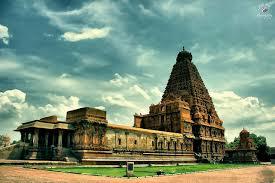 Thanjavur Periya Kovil
Thanjavur Periya KovilSample of Chola architectural prowess
All these achievements did not come without any human sacrifices. The Hindu kings had to outdo their Jain Kings with their architecture and their wealth. They had to compete with the Buddhist for support from the masses as Buddhism appeared kinder to those who lost out in the Sanāthana Dharma's caste system and gender discrimination. Even the Buddhists were no angels either. In their animosity with the Hindus, they collaborated with the invading Mogul army only to be played out, converted and chased away. That is how Buddhism spread eastwards and that is why they did not have representation in the Din-Illahi panel. Their role as a dominant religion had fizzled out. And the peaceful paths of all religions leaves a trail of blood, death, injustice and the ego to prove their assertions.
The scene in this snippet reminds me of the time in South Indian history when one great Shaivite poet, Sambanthar, managed to convert a Jain King to become a Hindu King. The first thing that the King did afterwards was to impale 3,000 plus of his kinsmen who refused to convert!In the movie clip, a Pandya King, puzzled after being rejected by a palace dancer, confides in his learned poet for solace. The Minister suggests divine indulgence for peace of mind. The King, a non-believer, demands proofs for the existence of God -where is He; which direction He is going to; what is He doing now?
As illustrated, the simple truths of Life were enumerated simply by a prodigy with her child-like precocious intelligence which is rampant in Hindu Purana stories.
So what or who or where is God? Like in the milk metaphor, the Milky Way (Universe) is the vessel that contains all lifeform matters and non-matters? It is the force that binds all these Existence which all culminated from The One - Milk, the elixir of life? Like the brightness from the lit candle, God, the Enlightened One, traverses all directions? That the Universe is always expanding? The Light as highlighted by the Sufi Mystics and Zoroastrians? That His 'actions' are the all the ill effects of all of Man's reckless actions, not His doings! Man does everything at the spur of the moment influenced by his ego, self-interest, compulsion, weakness and compassion that gets him into all kinds of mess but he blames God afterwards? After all, His 'doing' is just to juggle to keep the equations of opposing forces, to thermodynamic and other universal laws in steady state...http://asok22.wix.com/rifle-range-boy
http://.facebook.com/farouk.gulsara

Published on January 23, 2017 08:37

